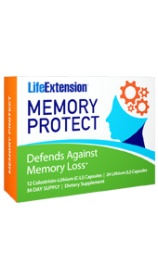In The News
March 2017

Vitamins C and E Associated with Decreased Risk of Dementia... By Nearly 40%!
An article in the Annals of Pharmacotherapy reports an association between the intake of vitamin C and E supplements and a lower risk of developing cognitive decline among men and women aged 65 and older.*
The investigation included 5,269 men and women who were free of dementia upon enrollment in the Canadian Study of Health and Aging from 1991 to 2002. Follow-up examinations conducted during 1996-1997 and 2001-2002 provided post-enrollment diagnoses of dementia or cognitive impairment without dementia.
Over up to 11 years of follow up, 821 cases of all-cause dementia were diagnosed and 882 cases of cognitive impairment without dementia developed. In comparison with those who did not report supplementing with either vitamin, the use of vitamin C and/or vitamin E was associated with a 38% lower adjusted risk of dementia from any cause.
Editor’s Note: For cognitive impairment without dementia, the adjusted risk was 23% lower among those who used either or both vitamins. Evaluation of the effects of using either vitamin alone resulted in associations with similar risk reductions.
Reference
* Ann Pharmacother. 2016 Oct 4.
Latest Vitamin D Research Suggests Lifespan Link and More... to Family Health
 |
In an investigation published in Cell Reports, a team from the Buck Institute found that vitamin D extended median lifespan in the roundworm C. elegans by a third and helped support protein homeostasis, the ability of proteins to maintain shape and function.*
“Vitamin D3 reduced the age-dependent formation of insoluble proteins across a wide range of predicted functions and cellular compartments, supporting our hypothesis that decreasing protein insolubility can prolong lifespan,” reported research team leader Karla Mark, PhD.
“Vitamin D engaged with known longevity genes. It extended median lifespan by 33% and slowed the aging-related misfolding of hundreds of proteins in the worm,” explained senior author Gordon Lithgow, PhD.
Quercetin Improves Rheumatoid Arthritis Symptoms and Disease Activity
 |
A recent report in the Journal of the American College of Nutrition found a remarkable benefit for supplementing with quercetin in a randomized, double-blind trial of women with rheumatoid arthritis.*
The trial included 40 female rheumatoid arthritis patients who were given 500 mg of quercetin or a placebo daily for eight weeks. Blood samples collected prior to and after the treatment period were analyzed for erythrocyte sedimentation rate and high-sensitivity tumor necrosis factor-alpha. These two blood tests are a measure of inflammation.
The findings of physician-administered examinations that determined the number of swollen and tender joints were combined with erythrocyte sedimentation rate results to calculate disease activity. Health assessment questionnaires assessed quality of life and disability.
At the end of the trial, women who received quercetin had less early morning stiffness, morning pain and pain after activity compared to pretreatment levels. In contrast, those who received a placebo experienced nonsignificant changes.
Brand-Name Drug Prices Rise at Shocking Rate
 |
A new study finds that older Americans are being gouged by the prices of brand-name drugs, which skyrocketed last year at a rate 130 times faster than inflation.*
Researchers at the nonprofit organization AARP discovered that the retail prices of 268 brand-name prescription drugs rose, on average, 15.5% in 2015 against a 0.1% increase in the rate of general inflation. The drugs, which are commonly taken by seniors, include 49 that are used to treat diabetes, high cholesterol, high blood pressure and other wide spread, chronic conditions.
Former Drug Company Execs Charged in Price-Fixing Plot
 |
As part of an ongoing Department of Justice investigation into the generic drug industry, charges have been brought against two ex-drug company executives for allegedly participating in a bid-rigging and price-fixing plot.*
Named in separate two-count felony cases were Jason Malek, the former president of Heritage Pharmaceuticals, and Jeffrey Glazer, the company’s former CEO. The alleged scheme involved two drugs: the diabetes medication glyburide and doxycycline hyclate, an antibiotic. According to court papers filed in Philadelphia, the scheme was in effect possibly dating back to April 2013 and continued to December 2015.
The cost of 500 tablets of doxycycline is reported to have gone from $20 in October 2013 to a whopping $1,845 in May 2014.
For full article and references, go to Life Extension® Magazine Alzheimer’s Disease: Landmark Study
To begin your journey to Optimal Brain Health, go to the BEST source for New Health and Medical Findings From Around the World! LIFE EXTENSION!
Get NEW! Life Extension® Memory Protect: Powerful Dual-Action Cognition & Memory Support 

April 2017
Vitamin E Could Help Protect Older Men from Pneumonia
 |
An article in the journal Clinical Interventions in Aging reported a protective role for vitamin E against pneumonia in older men.*
Dr. Harri Hemilä analyzed data from the Alpha-Tocopherol, Beta-Carotene (ATBC) Cancer Prevention Study conducted in Finland from 1985-1993. The trial included 29,133 men between the ages of 50 to 69 years who smoked at least five cigarettes daily upon enrollment. Participants received vitamin E, beta carotene, both supplements, or a placebo for five to eight years.
The current study was limited to 7,469 ATBC participants who started smoking at age 21 or older. Among this group, supplementation with vitamin E was associated with a 35% lower risk of developing pneumonia in comparison with those who did not receive the vitamin. Light smokers who engaged in exercise had a 69%lower risk compared with unsupplemented members of this subgroup.
Editor’s Note: Among the one-third of the current study’s population who quit smoking for a median of two years, there was a 72% lower risk of pneumonia in association with vitamin E supplementation. In this group, exercisers who received vitamin E experienced an 81% lower pneumonia risk.
Reference
* Clin Interv Aging. 2016 Oct 3;11:1379-1385.
Surgeon Who Specializes Could be Best for the Job...and Family Health
 |
A new retrospective analysis shows that the best surgeon for the job is one who specializes in that particular operation.*
More than 695,000 operations performed by 25,152 surgeons were analyzed for the study, published in the July 2016 issue of The BMJ. Researchers focused on eight complex cardiovascular and cancer surgical procedures, which, pre-study, had mortality rates of from 1% to 7%.
For six of the eight types of procedures, patients were found to have a lower risk of dying when that particular operation made up a large proportion of overall operations done by the surgeon.
The study authors, using the example of heart valve replacement, say their results suggest that a doctor who performs that procedure and no other 20 times may end up with better outcomes than a surgeon who does 40 heart valve replacements among a mix of 60 other types of procedures.
Editor’s Note: The question of why mortality rates are lower for operations performed by more specialized surgeons was not considered by the study. Researcher and Harvard University fellow Nikhil Sahni said, “Doctors may be better able to keep abreast of evolving science and surgical techniques as they specialize. Or perhaps specialists avoid the distraction that comes from switching between multiple procedures.”
Get Life Extension® Super-Absorbable CoQ10
To begin your journey to Optimal Heart Health, go to the BEST source for New Health and Medical Findings From Around the World! LIFE EXTENSION!
Get Life Extension® Super-Absorbable CoQ10
 And, then get Super Selenium Complex
And, then get Super Selenium Complex

FHF
PREFERRED AFFILIATE SITES:

No comments:
Post a Comment